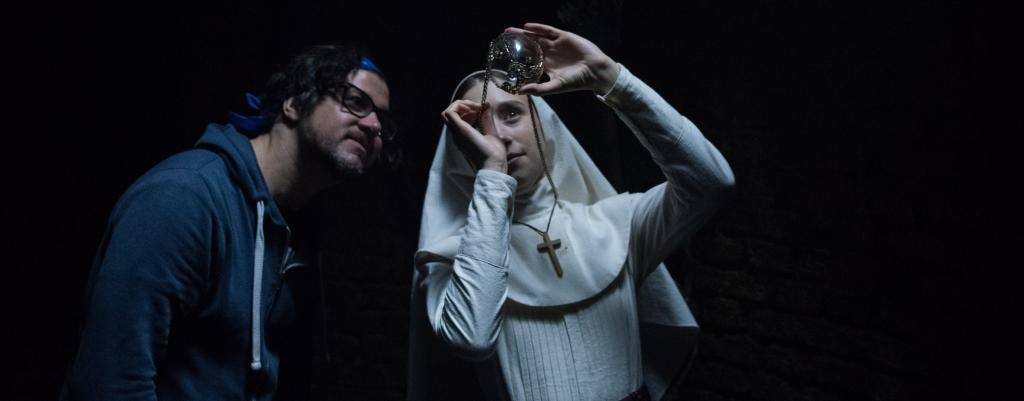MEXICO CITY — The Nun — the latest installment in the Conjuring franchise, which has already produced one sequel to the original film and two prequels about the creepy doll Annabelle — is set in Romania, but the studio is promoting the film in Mexico, flying journalists in from around the world to watch the movie in a former convent that has been converted into something of a haunted house for the occasion.
The screening itself takes place in what appears to be a chapel, on a night when the rain is falling hard — and dripping through a few holes in the ceiling. Also, just as the journalists show up, it begins to hail. Corin Hardy, the British director who is making his major Hollywood debut with this movie, jokes during the introduction that Warner Brothers has spared no expense to set the right mood for the occasion.
After the screening, the studio ushers the journalists from one room to another, where the key events of the film are re-dramatized — a spooky nun walks down a hall as the lights go out, actors dressed as ghosts hide behind every corner in the building’s low-ceilinged catacombs, and a bell hanging next to a coffin outdoors begins to ring.
It isn’t until the next evening that the reporters get to speak to the filmmakers themselves — and the interview, like the screening, takes place in the former convent.
The first interviewee to show up is Taissa Farmiga (sister of The Conjuring co-star Vera Farmiga), who plays Sister Irene, a novitiate who has been asked to help investigate a nun’s suicide. Farmiga says it’s “fun” to be doing publicity in this somewhat dilapidated building, instead of a hotel. “Oh my gosh, it’s so c-c-cold,” she says, pretending (?) to shiver, “but also I’m awake and present, and there’s an excitement in the air.”
Someone asks if Farmiga has had ‘The Nun Experience’ — the studio’s term for the haunted-house tour we got last night — and she replies, “I had it for two months while we were filming it!”
She is soon joined by Hardy and by Demián Bichir, the Mexican-American actor (and Oscar nominee for 2011’s A Better Life) who plays Father Burke, the priest who has been assigned by the Vatican to take the lead in investigating the suicide.
Hardy has brought some sketchbooks with concept art and storyboards that he whipped up during pre-production. He calls them “rough sketches”, but some of them are incredibly detailed, showing the convent on the hill and the trees and ghosts below.
As it happens, one of the journalists in this room is, herself, a nun, and she asks what kind of “research” the filmmakers did: Did they consult with religious experts, or did they just watch all the old devil movies? “Yes to watching the movies,” says Hardy, “because that’s the sort of school I’m coming from, as someone who relishes visual storytelling.”
Hardy — who caught the producers’ attention with his independently-produced horror film The Hallow — notes that the script for The Nun had already been written before he came on-board, and that he had ten weeks to do all the casting and location scouting. “Unlike something like The Hallow, which I spent eight years putting together and researching, I had to certainly go with the flow,” he says. “But we also tried to get as much [research] as we could and treat everything with as much respect as we could.”
He also notes that a Romanian priest came to the set and performed a blessing. “He also covered me in holy water. He certainly seemed to have sort of done the job.”
Farmiga — who started working on The Nun mere days after another project — says she would have liked to have more time to research what being a nun is like, but she did what she could to provide the role with some “authenticity”.
“I found personally quite a bit of information in regards to the physicality of being a nun, and how you always have to be watching yourself and trying to improve yourself for the Lord and struggle to be as perfect as you can be,” she says.
“And one of the things I really wanted to incorporate was not the rules but how you watch yourself and how you hold yourself. You walk humbly, you walk close to the walls, close doors quietly, don’t engage in useless conversation, and usually — from my research — that’s for the nuns and novitiates when you’re in the abbey and in the church, but I also wanted to incorporate that when Sister Irene was out in the world, always trying to be the best version of herself that she could be.
“And I found that fascinating, because I realized what dedication and strength and emotional strength that takes to actively acknowledge your flaws as a human being and try to correct yourself and try to be better. And, you know, we’re all humans, we’re all flawed, but it’s difficult to pinpoint that every day and try to progress. So that’s something I really took to heart, just for myself. I wanted to learn to always try to be a little bit better.”
Bichir — whose last major-studio movie was last year’s Alien: Covenant — says he’s “not a big horror film fan,” but he liked the idea that Father Burke is not only a priest but a “soldier” in the fight against evil. “And just like any soldier in any army, it doesn’t matter if you have your own demons or if you’ve had trouble before, if you are waking up in the middle of the night with nightmares. When they call, you gotta get up and go perform and do it and accomplish your mission, and that’s precisely what Father Burke does.”
Bichir says he also prepared for the role by going back to memories of his grandmother, and he hints that this may have helped to strengthen his belief in the supernatural.
“Those were my first encounters with religion,” he says. “I would go with her to church and be with her, and she taught me how to pray and how to cross and all that, so I took all that back, and for the period of time we were shooting the film, I was praying every night. I was going through all my prayers, the way I learned them, and I was surprised that I remembered everything, and I even knew a few things in Latin! So I was going through all that, really, truly believing that. So, yes, I could say that made it stronger.”
Hardy, who directed a number of music videos and short films before turning to feature films, got his start with a stop-motion film called Butterfly, in which a desperate man grapples with questions of God and death. Religious themes are also not entirely absent from The Hallow, in which a man listens to a song based on the Beatitudes. And now, of course, there is The Nun. Is there something that draws Hardy to this material?
“It’s really just, I suppose, questioning ourselves,” he replies. “Butterfly in particular was my first short film, it took me five years to shoot it, I was on my own in a workshop most of that time. I had written a story. I wanted it to be a live-action movie, actually. And it was around the time my sister’s partner had died, so I was kind of questioning that. So it was kind of like a passion to try and question what coping with death was.
“It’s a sort of fascination,” he adds. “I love the fantastical elements and the visual elements and all of that, and I want to ground them in emotion, and whatever I believe doesn’t really matter, because I believe in the human spirit, and that’s my faith.”
The Nun, like The Hallow, has a book with supernatural secrets, mysterious forests, and stuff that oozes. How much of this was already there in the script when Hardy joined the new film, and how much of it was his contribution?
“There’s always books. In horror movies, there’s always books!” he laughs.
“With The Hallow, since you asked, my take was fairy tales come from somewhere, the Bible comes from somewhere, people have different interpretations of what is real and what they believe, and people have different takes on that, and that’s fine. In Ireland, there are still stones in a field and people won’t harvest the field because there are fairies. So I was fascinated with exploring that, and thinking, ‘Well, if fairy tales are real, what would be the Bible of fairy tales,’ and there was The Book of Invasions.
“But again, I’m making a movie, I’m a storyteller, and I want to tell a movie that you’re going to watch and it’s going to be an exciting cinematic experience, so I’m obviously going to interpret things in certain ways and play things in certain ways. And in the same way, with The Nun, we’re embracing ideas and beliefs but we’re also forming our own story.”
The conversation turns to what people find appealing about horror movies, and someone alludes to something Wes Craven once said, to the effect that people are already scared and they want movies to bring some sort of order — and closure — to their fears.
Of course, a lot of horror movies end on a note that suggests the horror isn’t really over yet, and The Nun in particular is a prequel that revolves around a demonic figure who goes on to terrorize other characters years later in The Conjuring 2.
But Hardy says there is, indeed, something to Craven’s theory — and he says his film is, ultimately, about a battle between good and evil (in which, not incidentally, goodness is defined through the rituals and relics of Catholic Christianity). “I honestly am scared of the real world more than I’m scared of horror movies and fictional stories,” he says. “I find a kind of comfort in it for that reason. You get to go in, you get to be told a story. The stories I like ultimately have hope in them. It’s important that this have hope in it.”
– – –
‘The Nun Experience’, as captured on video by the studio (and yes, you can see yours truly in a few shots here):
The ‘Faith over Fear’ promo for “faith-based” viewers:
https://www.youtube.com/watch?v=MfdSEFvFPig
A featurette explaining how The Nun fits into the Conjuring timeline:
The Nun comes to theatres across North America on September 7.













